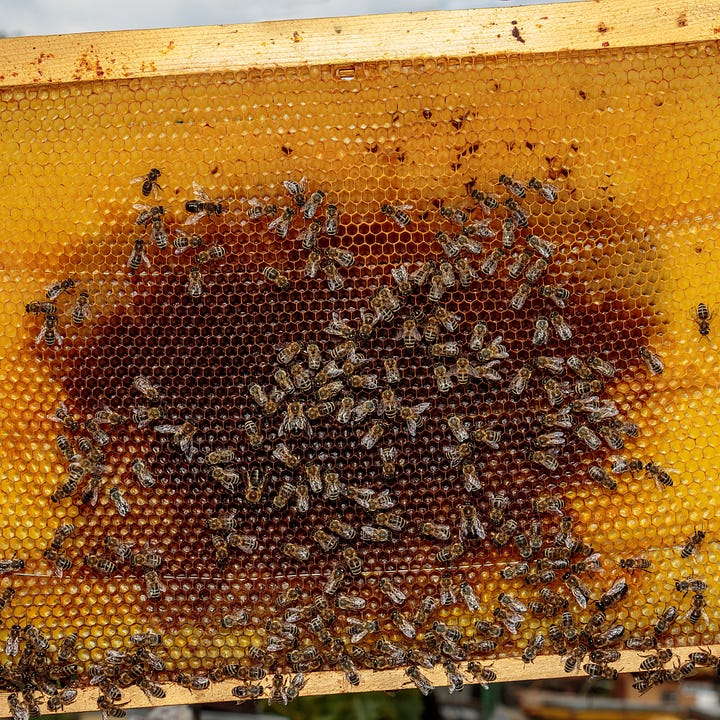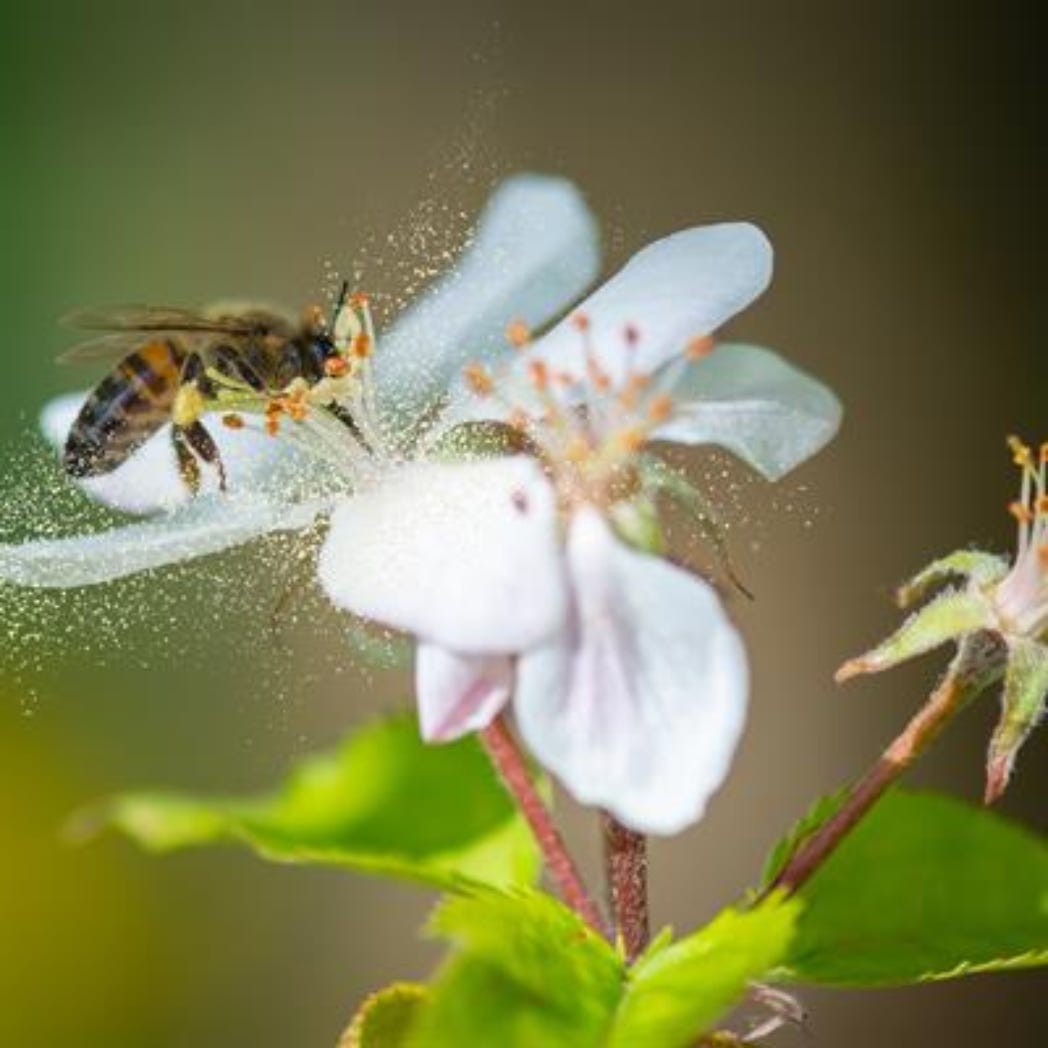I’m a big fan of
and honey bees, but they really haven’t been getting along recently. Big noisy fights with armour, retreats into bushes and war wounds galore. I read brave Will’s tales of a wounded apiarist almost needing to look away at times as he retold his recent battles with his angry psychotic bees. It got me thinking about bees and how to stop them being so cranky, I wondered if sound therapy would help calm the farm in the apiary. I turned to the research to find my answer, and it seems the researchers have more pressing matters to contend with, than the effect of Bach on Will’s psychotic bees. Having emerged from a research black hole I thought I might share some of what I learned.The humble honeybee, these tiny, buzzing creatures carry the weight of the world’s food supply on their delicate wings. As I watch bees happily flit from flower to flower in my garden, I’m reminded of their extraordinary importance not only to our ecosystem but also to the vast global network of food production that sustains us all. Yet, behind the scenes, a quieter, insidious threat looms, one that impacts not just the bees but all of us who depend on their tireless work.
I wanted to share some insights about these fascinating creatures, the challenges they face, and the pivotal role of something you might not have thought much about: their microbiome.
Why Honeybees Matter
Honeybees are more than just honey producers; they are pollinators extraordinaire. They pollinate around 75% of the world’s flowering plants, including many of the fruits, vegetables, and nuts we eat. Without bees, our diets would look drastically different, and the ripple effects would be felt through ecosystems and economies alike. A world without bees is a world with far less diversity, on our plates and in our environments.
But bees do more than ensure we have strawberries and almonds. They support the biodiversity of plants and trees, which in turn provides habitats for countless other species. When bees thrive, so does the rest of nature. When bees falter, however, the consequences are profound.



The Mounting Threats to Bee Health
Despite their importance, honeybees are under siege. Diseases, parasites, environmental stressors, and pesticides have all contributed to widespread colony losses. One of the most alarming phenomena is Colony Collapse Disorder (CCD), where worker bees suddenly abandon the hive, leaving behind their queen, young, and food stores. While the causes of CCD are complex and multi-faceted, one thing is clear: bees are struggling, and we need to understand why.
A big part of this story revolves around their gut microbiome. Just as we humans depend on a healthy gut microbiome for digestion, immune support, and overall well-being, honey bees rely on theirs for survival. And when this delicate microbial balance is disrupted, it opens the door to diseases that can devastate colonies.
The Bee Gut Microbiome: A Small World with Big Consequences
You may be wondering, how does something as small as a bee have a microbiome? And why does it matter so much?
Let me start by explaining that the bee gut is home to a highly specialised community of bacteria that help bees digest food, fend off infections, and regulate their immune systems. Recent studies (Motta et al., 2022) have shown that this tiny ecosystem of microbes plays an outsized role in keeping bees healthy and resilient against threats. When the microbiome is disrupted, whether by pesticides, poor nutrition, or disease bees become more susceptible to harmful pathogens like Nosema ceranae and bacterial infections like Serratia.
One study I read recently highlighted just how crucial this balance is. Nosema ceranae, a common parasite, doesn’t just make bees sick on its own, it also opens the door for other infections. Research by Braglia et al. (2024) found that this parasite can actually promote the growth of Serratia, a harmful bacterium, in the bee gut. This double whammy leaves bees more vulnerable and can accelerate colony collapse.
Microbial Therapeutics: A Ray of Hope
Here’s where things get a bit more optimistic. Scientists are looking at ways to use probiotics to bolster bee health, just like how we take probiotics to support our gut. Probiotics, which are beneficial bacteria, could help restore balance to a disrupted bee microbiome. Several studies, including those by Killam et al. (2024) and Sokolowski (2020), suggest that introducing certain probiotic strains into bee colonies could strengthen their immune systems, reduce the impact of harmful pathogens, and even improve hive productivity.
Imagine probiotics for bees, microbial therapeutics that could be as simple as adding the right bacteria to their diets. These bacteria help bees digest their food better, detoxify pesticides, and outcompete harmful microbes that threaten their health. This isn’t just a future possibility; it’s something researchers are actively developing and testing right now.
The Importance of Protecting Bee Health
As I reflect on all of this, it’s clear to me that the health of bees and their microbiomes is tied to the health of our entire food system. We need to understand the full picture of what’s happening inside the hive—from the tiniest microbes in a bee’s gut to the global forces threatening their survival. The good news is that by supporting the microbiome, we might be able to help turn the tide for honeybees.
So what can we do? For one, we can support sustainable agriculture that reduces pesticide use and promotes biodiversity. The fewer chemicals bees are exposed to, the healthier their guts, and the healthier they are overall. We can also support local beekeepers and advocate for research into microbial therapeutics and other bee health interventions. Every little bit helps.
A Buzzing Call to Action
Honey bees may be small, but their impact is vast. By taking care of their health, starting from the microscopic world of their microbiomes, we are, in turn, taking care of our own futures. The next time you see a bee buzzing around your garden, remember: it’s not just a pollinator, it’s a tiny ecosystem, working to keep nature, and us thriving.
Let’s work to protect them, for the bees and for all of us who rely on their magical dance through the flowers.
It’s probably about now that I would normally launch into a honey centric recipe, but for today I think I’ll leave it here, and allow some space to contemplate the importance of bees to the ongoing survival of life on earth, and to think about poor Will Coopers war wounds. Do head over and read his article on his battle with psychotic bees, I really enjoy his writing. I just can’t get the image of him hiding from the bees in the bushes out of my mind.
References
Braglia C, Alberoni D, Garrido PM, Porrini MP, Baffoni L, Scott D, Eguaras MJ, Di Gioia D, Mifsud D. “Vairimorpha (Nosema) ceranae can promote Serratia development in honeybee gut: an underrated threat for bees?” Front Cell Infect Microbiol. 2024 May 13;14:1323157. doi: 10.3389/fcimb.2024.1323157. PMID: 38808063; PMCID: PMC11131372.
J. B. Nguyen, C. W. Marshall, C. N. Cook; “The buzz within: the role of the gut microbiome in honeybee social behavior.” J Exp Biol 1 February 2024; 227 (3): jeb246400. doi: https://doi.org/10.1242/jeb.246400"
Killam, Sophie M. & Daisley, Brendan & Kleiber, Morgan & Lacika, Julia & Thompson, Graham. (2024). “A case for microbial therapeutics to bolster colony health and performance of honey bees.” Frontiers in Bee Science. 10.3389/frbee.2024.1422265.
Motta EVS, Powell JE, Leonard SP, Moran NA. “Prospects for probiotics in social bees.” Philos Trans R Soc Lond B Biol Sci. 2022 Jun 20;377(1853):20210156. doi: 10.1098/rstb.2021.0156. Epub 2022 May 2. PMID: 35491599; PMCID: PMC9058534.
Pearce AN, Huang ZY, Breed MD. “Juvenile hormone and aggression in honey bees.” J Insect Physiol. 2001 Nov;47(11):1243-1247. doi: 10.1016/s0022-1910(01)00109-3. PMID: 12770175.
Sokolowski MB. “Honey bee colony aggression and indirect genetic effects.” Proc Natl Acad Sci U S A. 2020 Aug 4;117(31):18148-18150. doi: 10.1073/pnas.2012366117. Epub 2020 Jul 20. PMID: 32690713; PMCID: PMC7414082.
Westwick, Rebecca R. "Linking Previous Experiences to Behavior and Health in the Honey Bee (Apis Mellifera)." (2023)."
Further reading on the bees
USDA Agriculture Research Service. ARS Honeybee Health
European Environment Agency. “How Pesticides impact Human Health and Ecosystems in Europe”
Will Cooper’s @aprivatechef “Beware of Psychopaths”
If you have enjoyed this article or gained some value from my work I’d really appreciate you pressing the heart button and perhaps even restacking this piece if you feel inclined. It helps to me on many levels.









Well researched and very important information - thank you for sharing.
Sad state of our earth. My three year old grandson and I set out to find insects in his yard, footpath and neighbours fences.
We found a few ants. No lizards, spiders, bees, beetles, bugs and not one bee. Zilch. They have all gone.